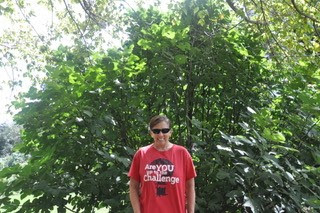Beverly says that her favorite part of earning her certification was twofold. She was able to learn about new, engaging activities to use in the classroom and also was able to network and learn from others. Looking back on her certification process, Beverly recollects that getting to see different environmental education centers was a certification experience that stood out for her. She especially liked visiting ones she had not been to in years, such as Grandfather Mountain.
For her community partnership project, Beverly created a pollinator garden at her school in Cleveland County. She even reached out to a plant nursery to get the proper plants donated. Beverly was impressed by the enthusiasm the project brought out in her students. “I was really surprised at how much the kids enjoyed getting outsides to do the project! I think many of them felt ownership in the garden because they were involved in getting it established.” Beverly also seeks to continue to grow the pollinator garden beyond her project. “I’m hoping to add to it every year!”
Beverly feels that the program gave her a unique perspective as a formal educator. The Environmental Education Certification helped to change her approach to teaching. “It has given me new ideas on how to integrate more environmental education activities into the curricular instruction that I currently do. And, I have always seen a benefit in partnerships between formal and informal educational mindsets, and environmental education helped to solidify that.”
The lessons learned from formal and informal education partnerships continues to affect her. It has influenced how Beverly thinks about environmental issues and their integration in the formal classroom. “Networking with environmental education colleagues through some of the workshops gave me some ideas on how informal educators instill a respect for the environment. I hope I might be able to do that as well, being a formal educator.”
To learn more about the Schiele museum of Natural History, visit them at www.schielemuseum.org. To find out more about the Office of Environmental Education and Public Affairs, visit us at www.eenorthcarolina.org.






























